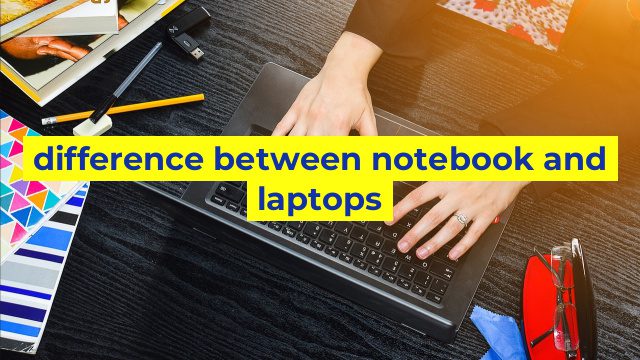Difference Between Notebook and Laptops
When it comes to purchasing a portable computer, people often get confused between the terms notebook and laptop. Although these two terms are often used interchangeably, they are not the same. Here are some differences between them:
Size and Weight
The primary difference between a notebook and a laptop is their size and weight. A notebook computer is generally smaller and lightweight than a laptop. Notebooks are also thinner, weigh less, and are easier to carry around. On the other hand, laptops are bulkier, heavier, and not as easy to carry around.
Functionality
The functionality of notebooks and laptops also varies. Notebook computers are typically designed for basic tasks like browsing the internet, creating documents, and sending emails. They do not have high-end components like graphics cards or processors, which means they are not suitable for gaming or heavy-duty tasks. On the other hand, laptops are designed to handle more demanding tasks. They have a more powerful processor and graphics card, which makes them suitable for tasks like gaming, video editing, and running high-end software.
Battery Life
Battery life is another area where notebooks and laptops differ. Generally, notebooks have longer battery life than laptops. This is because notebooks are designed for basic tasks and have a limited range of features. Laptops, on the other hand, have more features and use more power, which means they typically have a shorter battery life.
Price
Notebooks are generally less expensive than laptops. This is because notebooks have limited features and less powerful components. Laptops, on the other hand, have a wider range of features and more powerful components, which makes them more expensive.
Conclusion
In conclusion, both notebooks and laptops have their own advantages and disadvantages. If you need a portable computer for basic tasks like browsing the internet and sending emails, a notebook may be the best option. If you need a computer for more demanding tasks like gaming, video editing, or running high-end software, a laptop may be the better choice. Regardless of which option you choose, make sure to consider all the features and factors before making a purchase decision.
Table difference between notebook and laptops
| Notebook | Laptop | |
|---|---|---|
| Usage | Primarily used for basic computing tasks such as browsing, word processing, and emailing. | Used for more intensive tasks such as gaming, graphic design, and video editing. |
| Size and Weight | Generally smaller and lighter in weight, making them more portable and easier to carry around. | Often larger and heavier in weight, making them less portable and more difficult to carry around. |
| Power | Typically lower in power, making them more energy-efficient and better for longer battery life. | Often more powerful than notebooks, with dedicated graphics cards and higher-end processors. |
| Price | Usually less expensive than laptops. | Often more expensive than notebooks due to their higher-end components and capabilities. |
